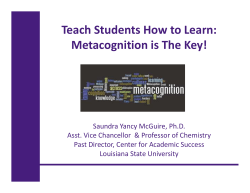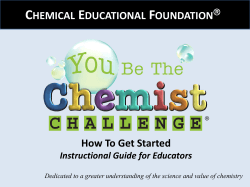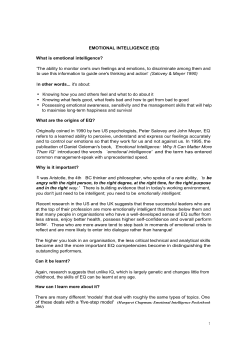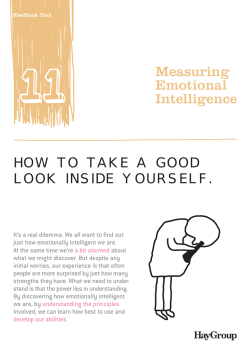
Providing Effective Tutoring and Study Group Sessions: Strategies that Work!
Providing Effective Tutoring and Study Group Sessions: Strategies that Work! Saundra Yancy McGuire, Ph.D. Assistant Vice Chancellor Professor, Department of Chemistry Past Director, Center for Academic Success Louisiana State University Desired outcomes • We will identify the challenges faced by tutors who are helping their peers • We will understand the role of metacognition in helping peers • We will collaboratively develop concrete strategies that will increase our effectiveness with our peers • Other outcomes you’d like to see? Reflection Questions • What’s the difference, if any, between studying and learning? • What are two things that inhibit your effectiveness as a peer tutor? The Story of Four Students • Travis, junior psychology student 47, 52, 82, 86 B in course • Robert, first year chemistry student 42, 100, 100, 100 A in course • Maryam, first year art student 57, 87 B in course • Dana, first year physics student 80, 54, 91, 97, 90 (final) A in course Final Examination Improvement Chemistry 2001 Test 1 Test 2 Test 3 Final Class Average Student 1 Student 2 Student 3 Student 4 76 65 67 70 83 52 67 65 46 55 72 61 68 68 65 78 107 88 88 90 Date of Final Exam: December 14, 2005 Meeting with Student No. 1: December 12, 2005 Meeting with Student Nos. 2 & 4: December 2, 2005 Meeting with Student No. 3: December 8, 2005 The final was worth 100 points with a 10 bonus question. How’d They Do It? They became expert, strategic learners by using metacognition! They studied to LEARN, not just to make the grade! Metacognition* The ability to: • think about one’s own thinking • be consciously aware of oneself as a problem solver • monitor and control one’s mental processing (e.g. “Am I understanding this material?”) • accurately judge one’s level of learning *Flavell, J. H. (1976). Metacognitive aspects of problem solving. In L. B. Resnick (Ed.), The nature of intelligence (pp.231-236). Hillsdale, NJ: Erlbaum Why don’t many students already have effective learning strategies? It wasn’t necessary in high school* - 63% of 2010 entering first year students spent less than six hours per week doing homework in 12th grade. - More than 48% of these students said they graduated from high school with an “A” average.* *2010 Higher Education Research Institute Study Peer Tutors Can Help Students close “the gap” between effective and ineffective learning behaviors current behavior effective behavior current grades desired grades Peer Tutors Must Help Students Learn How to Learn! • Help them understand the learning process • Teach them specific learning strategies • Encourage them to monitor their use of the learning strategies Turning Your Students into Efficient, Expert Learners • Have them constantly ask “why” and “what if” questions • Have them test their understanding by verbalizing or writing about concepts; practicing retrieval of information • Have them move their activities higher on the Bloom’s taxonomy scale by comparing and contrasting, thinking of analogies, thinking of new pathways, etc. Combining information to form a unique product; requires creativity and originality. Evaluation Synthesis Using information to solve problems; transferring abstract or theoretical ideas to practical situations. Identifying connections and relationships and how they apply. Application Comprehension Restating in your own words; paraphrasing, summarizing, translating. Knowledge Louisiana State University Center for Academic Success B-31 Coates Hall 225-578-2872 www.cas.lsu.edu High School Memorizing verbatim information. Being able to remember, but not necessarily fully understanding the material. Identifying components; determining arrangement, logic, and semantics. Undergraduate Analysis Making decisions and supporting views; requires understanding of values. Graduate School Bloom’s Taxonomy This pyramid depicts the different levels of thinking we use when learning. Notice how each level builds on the foundation that precedes it. It is required that we learn the lower levels before we can effectively use the skills above. A Learning Strategy that can be quickly and easily implemented to help students think at higher levels: The Study Cycle* *adapted from Frank Christ’s PLRS system The Study Cycle 34 Reflect Review Preview Preview before class – Skim the chapter, note headings and boldface words, review summaries and chapter objectives, and come up with questions you’d like the lecture to answer for you. Attend Attend class – GO TO CLASS! Answer and ask questions and take meaningful notes. 4 Reflect Review Study Assess Review after class – As soon after class as possible, read notes, fill in gaps and note any questions. Study – Repetition is the key. Ask questions such as ‘why’, ‘how’, and ‘what if’. • Intense Study Sessions* - 3-5 short study sessions per day • Weekend Review – Read notes and material from the week to make connections Assess your Learning – Periodically perform reality checks • Am I using study methods that are effective? • Do I understand the material enough to teach it to others? *Intense Study Sessions Decide what you want to accomplish in your study session 1 Set a Goal 2 Study with Focus (30-50 min) Interact with material- organize, concept map, summarize, process, re-read, fill-in notes, reflect, etc. 3 Reward Yourself (10-15 min) Take a break– call a friend, play a short game, get a snack 4 Review (1-2 min) (5 min) Go over what you just studied Center for Academic Success B-31 Coates Hall ▪ 225.578.2872 ▪www.cas.lsu.edu Help Your Students Develop the Right Mindset Dweck, Carol, 2006. Mindset: The New Psychology of Success. New York: Random House Publishing Shenk, David, 2010. The Genius in All of Us: Why Everything You've Been Told About Genetics, Talent, and IQ Is Wrong. New York: Doubleday Mindset* is Important! Fixed Intelligence Mindset Intelligence is static You have a certain amount of it Growth Intelligence Mindset Intelligence can be developed You can grow it with actions Dweck, Carol (2006) Mindset: The New Psychology of Success. New York: Random House Publishing Mindset determines reactions to • Challenges – avoid vs. embrace • Obstacles – give up easily vs. persist • Tasks requiring effort – fruitless vs. path to mastery • Criticism – ignore vs. learn from • Success of Others – feel threatened by vs. find lessons and inspiration in The Role of Confidence in Learning and Performance Students are more likely to attempt activities about which they feel confident Peer Tutors can give students the confidence to try and the strategies to succeed! HOW? “If you think you can...or if you think you can't...you're right!“ Henry Ford Great Strategies for Helping Peers LEARN! • Establish expectations and ground rules • Help tutee set goals and timelines come often, prepared, and on ready to learn! • Attribute failures to correctable causes and success to personal competence • Celebrate successes! • Help students get to know each other and form study groups Metacognitive Get Acquainted Activity* • What do you believe is important to understand and learn in _____________________? • What do you believe to be critical characteristics of successful students in ___________? • How will you study and prepare for exams in ______________________________? *Simpson, M. & Rush, L. (2012) in Teaching Study Strategies in Developmental Education, Hodges, Simpson, Stahl eds. New York: Bedford/St. Martin’s Why Are Metacognitive Strategies Important? Consider the email from a Spring 2011 student: “…Personally, I am notbelow so good at chemistry and Chemistry unfortunately, at this point my grade for that class is reflecting exactly that. I am emailing you inquiring about a possibility of you tutoring me.” April 6, 2011 …And after learning metacognitive strategies, NOT tutoring: “I made a 68, 50, (50), 87, 87, and a 97 on my final. I ended up earning a 90 (A) in the course, but I started with a 60 (D). I think what I did different was make sidenotes in each chapter and as I progressed onto the next chapter I was able to refer to these notes. I would say that in chemistry everything builds from the previous topic. May 13, 2011 Semester GPA: 3.8 Motivation: The REAL Difference between a 1.8 and a 3.8 GPA! Motivate Your Students! • • • • • Strongly encourage them to: Consider their goals Develop a plan! (e.g. schedule study appointments with themselves; make a study bet with friends; devise a new place to study Commit to Three or More Intense Study Sessions per day (two during daylight hours) Take the CAS on-line workshops (www.cas.lsu.edu) Believe in themselves!!! Small Group Activity How can you infuse learning strategies information into sessions with your tutees?
© Copyright 2025





















